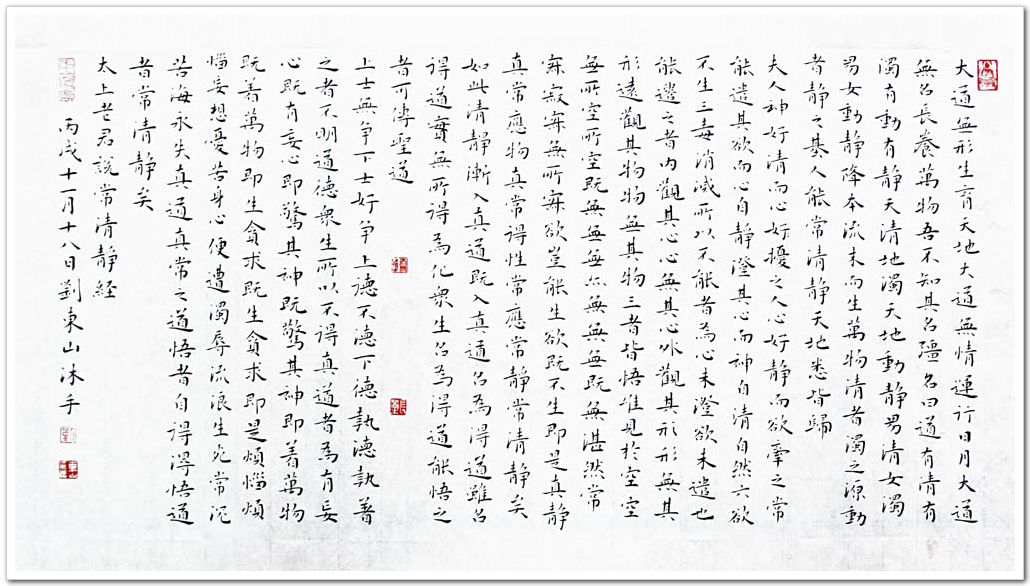太上老君说常清静经全文
Lao Zi speaks of the Sutra of Everlasting Peace (Qing Jing Jin)
Translated by LI Siming, 2010
Overview:
In this very brief yet condensed article, Laozi summaries the nature of the Dao, describes the dynamics of human spirit, mind and desire, defines meaning of transcending desire, explains different levels of emptiness, clarifies the meaning of obtaining Dao, and illustrates how Dao brings everlasting Peace.
* * *
老君曰:
大道无形,生育天地;大道无情,运行日月;
大道无名,长养万物;吾不知其名,强名曰道。
Lao Zi speaks:
The great Dao does not limit to forms, it gives born to the heaven and earth;
The great Dao does not enslaved by sentiments, it runs the sun and the moon;
The great Dao does not have a name, it nurtures everything;
I don’t know its name, for convenience purpose i name it Dao.
夫道者:有清有浊,有动有静;天清地浊,天动地静。男清女浊,男动女静。
降本流末,而生万物。
This Dao:
It can be seen as clear and muddy, as mobile and still;
For example; Heaven is clear vs. earth is muddy, heaven is mobile vs. earth is still;
man is simple and woman is complex, man is mobile and woman is still.
Through the manifestation of the Dao, all things created.
清者浊之源,动者静之基。人能常清静,天地悉皆归。
Clarity is the source of muddiness, mobility is the foundation of stillness.
If man can abide in this everlasting inner peace, heaven and earth both go back to its source.
夫人神好清,而心扰之;人心好静,而欲牵之。常能遣其欲,而心自静,澄其心而神自清。
Man’s spirit likes to be clear, but the mind disturbs it;
Man’s mind likes quietness, but desire enslaves it.
When desire is transcended, mind will return to its quietness,
and when the mind is pure, the spirit will return to its clearness.
自然六欲不生,三毒消灭。
所以不能者,为心未澄,欲未遣也。
In this state, six desires will not arise, and three poisons will disappear.
If you cannot achieve this state, it is because the mind is not yet pure, and desire not yet transcended.
能遣之者,内观其心,心无其心;外观其形,形无其形;远观其物,物无其物。
For those who can transcend (desire),
he look inside for the mind, and there is no mind;
he look outside for forms, and there is no form;
he look far away for things, and there is no thing.
三者既悟,唯见於空;
观空亦空,空无所空;
With these three situations realised, one see emptiness;
One look at emptiness itself, and found it too is empty,
as there is nothing to be emptied of;
所空既无,无无亦无;
无无既无,湛然常寂;
If there is no emptiness, then there is also no “non-emptiness”;
If there is no non-emptiness, then there is everlasting quietness.
寂无所寂,欲岂能生?欲既不生,即是真静。
If there is nothing to quiet, how could there be desire?
When desire does not arise, there is real quietness.
真常应物,真常得性;常应常静,常清静矣。
Face the world with this real-normalness, and you will receive a real-normal mind;
When you can face the world in this real-normalness and quietness, you achieve the everlasting inner peace.
如此清静,渐入真道;既入真道,名为得道,虽名得道,实无所得;
When you realise this everlasting inner peace, you start to step into the real Dao;
When you live in the real Tao, although it names as if you receive the Dao,
actually there is nothing to be received;
为化众生,名为得道;能悟之者,可传圣道。
For the purpose of sharing with the world, therefore we name it as receiving the Dao;
For those who realise this, can be transmitted this sacret Dao.
老君曰:
上士无争,下士好争;上德不德,下德执德。执著之者,不明道德。
Lao Zi speaks:
Upper men does not argue, lower men like to argue;
Upper morality does not appear to be moral, lower morality fixated on rules.
Those who fixated on rules, does not understand real morality.
众生所以不得真道者,为有妄心。
既有妄心,即惊其神;既惊其神,即著万物;
既著万物,即生贪求;既生贪求,即是烦恼;
烦恼妄想,忧苦身心;
但遭浊辱,流浪生死,常沉苦海,永失真道。
The reason why the mass public does not realise this real Dao is because, they attach themselves to a reckless mind.
For a reckless mind frightens the spirit, and a frightened spirit identifies itself with things;
Identification with things brings forth desire; and desire brings forth trouble.
Troubled mind and reckless thinking together, bring suffering to the body and mind;
As a result, one get irritated by the muddiness of the world, wander between live and death, sunk in the sea of suffering, and disconnected forever from the real Dao.
真常之道,悟者自得,得悟道者,常清静矣。
The real-normal Dao, realised person naturally obtain it,
Those who realised this Dao, therefore forever abide in everlasting peace.
太上老君说常清静经全文
概述:
在这个简短而简明的文章,老子(太上老君的化身)总结了道的性质,描述了人类灵,心和欲望的关系,指出如何超越欲望,解释了不同程度的空,和得道的意思。并说明了道如何带来永恒的平安。
* * *
老君曰:
大道无形,生育天地;大道无情,运行日月;
大道无名,长养万物;吾不知其名,强名曰道。
夫道者:有清有浊,有动有静;天清地浊,天动地静。男清女浊,男动女静。
降本流末,而生万物。
清者浊之源,动者静之基。人能常清静,天地悉皆归。
夫人神好清,而心扰之;人心好静,而欲牵之。常能遣其欲,而心自静,澄其心而神自清。
自然六欲不生,三毒消灭。
所以不能者,为心未澄,欲未遣也。
能遣之者,内观其心,心无其心;外观其形,形无其形;远观其物,物无其物。
三者既悟,唯见於空;
观空亦空,空无所空;
所空既无,无无亦无;
无无既无,湛然常寂;
寂无所寂,欲岂能生?欲既不生,即是真静。
真常应物,真常得性;常应常静,常清静矣。
如此清静,渐入真道;既入真道,名为得道,虽名得道,实无所得;
为化众生,名为得道;能悟之者,可传圣道。
老君曰:
上士无争,下士好争;上德不德,下德执德。执著之者,不明道德。
众生所以不得真道者,为有妄心。
既有妄心,即惊其神;既惊其神,即著万物;
既著万物,即生贪求;既生贪求,即是烦恼;
烦恼妄想,忧苦身心;
但遭浊辱,流浪生死,常沉苦海,永失真道。
真常之道,悟者自得,得悟道者,常清静矣。

